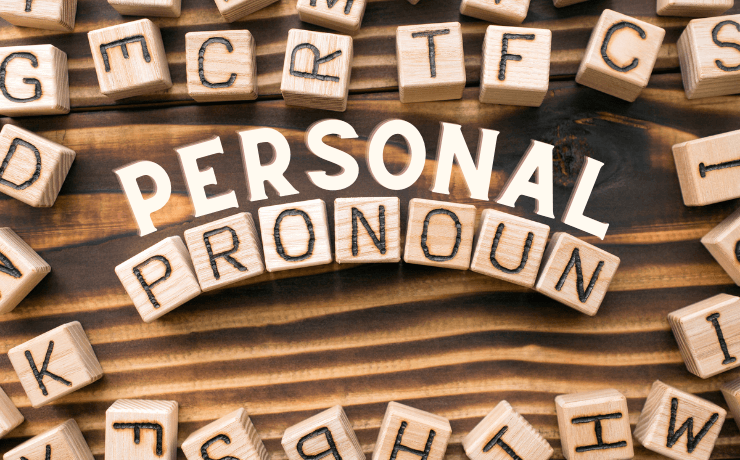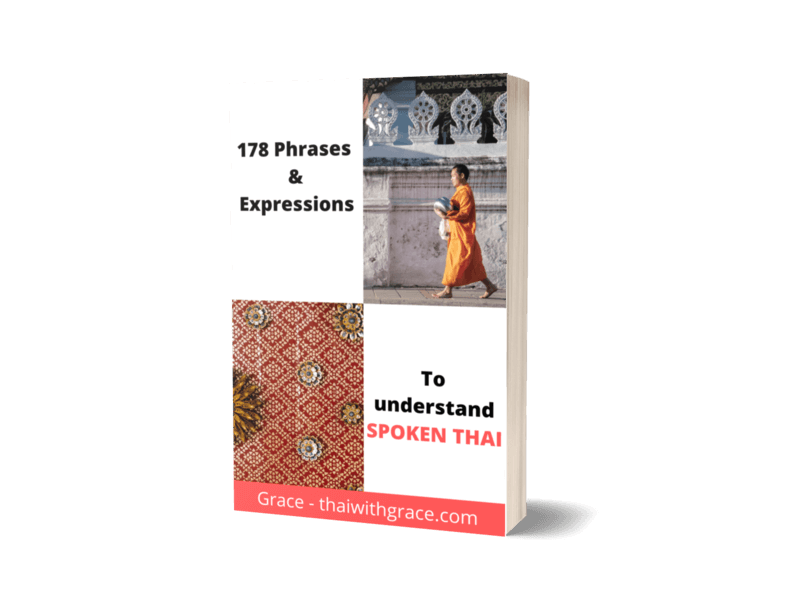If you have learned Thai from a book, you would see that ฉัน (chăn) and ดิฉัน (dì-chăn) is “I” for women and ผม (pŏm) is “I” for men. They are not wrong, but there are many more ways to say “I” to make you sound more like a real Thai.
In this article, I will explain the most common ways to say personal pronouns in Thai and the factors that influence your choice of personal pronouns.
Don’t say ฉัน (chan), ดิฉัน (dichan), and (ผม) pom all the time.
- When to use ฉัน (chan), ดิฉัน (dichan), and (ผม)?
- What influences Thai pronouns?
- Using your name (Women mostly)
- Using the word เรา rao as a Thai personal pronoun
- Using เค้า káo as a personal pronoun
- Using family terms as a personal pronoun
- Using หนู nŏo as a personal pronoun (for women)
- Using กู (Goo) as a personal pronoun in Thai (Rude)
- Tips when using personal pronouns in Thai:
- Summary
Please note, this article about first person pronouns in Thai is based on my experience. But not everyone in Thailand will agree.
Even amongst my family, we couldn’t agree.
For example, my brother thinks เค้า (káo) is too feminine for men to use.
My dad thinks กู (goo) is not that rude. In fact, in former times กู wasn’t rude at all.
Also, people in different parts of Thailand might use pronouns differently.
Also, I don’t cover all possible first person pronouns, only the ones that I feel are most commonly used.
Check out the video version of this article above and download the transcript of the video here.
When to use ฉัน (chan), ดิฉัน (dichan), and (ผม)?
Most of you know that “I” in Thai is “pom” for men and “chan/dichan” for women.
So when should you use these words?
When to use ผม (pom)?
When should you use ผม? If you are a guy, you can use this word with anyone, and it would be correct. This is the word you can fall back to if you don’t know which word to use.
The most appropriate uses are when talking to a stranger, older people, not close friends, teachers, etc. It’s considered polite, so it sounds too formal if you use it to talk to people younger than you or your friends.
When to use ดิฉัน di chan?
This is the most formal “I” for women that exists. It sounds super distant, i.e., I don’t want to be friendly, I don’t want to form a personal relationship with you.
You’ll mostly just see this word in a professional setting.
You shouldn’t use this word in a casual setting, such as buying street food, classroom setting, and especially when you want to create a good personal relationship with someone.
ดิฉัน (di chan) makes you sound super distant
When to use ฉัน chan?
chan is like the default for “I” for women. That’s why you see it in books and music. Actually, men can use it too when talking to females. chan is probably the word that you think is the most commonly used to say “I” for women, but actually, it’s NOT.
You can use it, but seriously, if you want to sound Thai, you shouldn’t. I will give you many alternatives that you can choose from, please keep reading.
Tips for ฉัน
One very important thing. If you want to raise your voice or sound angry, ฉัน is a good pronoun to use to create some space.
I will give you my personal example. My mother calls herself “แม่” (mae). When she is in a kind mother mode, she would say แม่อยากให้ทำการบ้านก่อนเล่นเกมส์ (I want you to finish your homework before playing game). But if I didn’t listen to her and I played games before finish my homework, when she catches me doing this, she scolded me by saying ฉันบอกให้ทำการบ้านก่อนทำไมไม่ฟัง!! (I told you to do your homework first, why are you not listening).
When I hear ฉัน from my mom, I know right away she’s not happy because she switched from the usual pronoun that she often uses, which is แม่ (mother).
What influences Thai pronouns?
Thai pronouns are more complex than in English. You say different words depending on:
- age (compared to the person you are speaking to)
- sex
- respect
- setting
- familiarity
So let me teach you the most Thai way to say “I”. There is no one way to say “I” but this should give you a good guideline when choosing personal pronouns in Thai.

Using your name (Women mostly)
I swear, using your name is the most common way for women.
Who would use their name as a pronoun in Thai?
Age: All Ages
Sex: women (mostly)
Respect: –
Situation: Casual
Familiarity: Yes
If I use a pronoun (I’m a woman and age 29), I would likely say my name.
So who else can use their name? Mostly women because if men use it, it can sound feminine. You can use it in casual situations no matter how old you are.
I am sure you are not used to saying your name. In English, you never say. “Grace likes ice cream” or “Jackie will go to sleep“. But in Thai, I swear, using your name is the most common way for women.
For example:
- Grace (“I”) wants to thank everyone
เกรซอยากขอบคุณทุกคน
Grace yàak kòp kun túk kon - Grace will eat sushi today
เกรซจะกินซูชิวันนี้
Grace jà gin soo-chí wan née
Using the word เรา rao as a Thai personal pronoun
Who can use เรา (rao) as a pronoun in Thai?
Age: Same age
Sex: All
Respect: –
Situation: Casual
Familiarity: Yes
You might think rao is just “we”. It is “we” but also it can be often used for “I”.
When I talk with my friends of the same age, we use “rao” all the time.
So, who can use “rao“? Men and women, all ages as long as everyone is around the same age and also in a casual setting.
For example:
- Sorry, I can’t go today.
ขอโทษนะ วันนี้เราไปไม่ได้
kŏr tôht ná · wan née rao bpai mâi dâai
Using เค้า káo as a personal pronoun
Who would use káo as a pronoun in Thai?
Age: Same age
Sex: All
Respect: No
Situation: Casual
Familiarity: Yes
You might think เค้า káo is only “he” or “she”. It is, but it’s also a word Thais also commonly use to say “I”.
I’d say its uses are interchangeable with the previous word, “rao“.
For example:
- I’m sick today, I can’t go out.
วันนี้เค้าป่วยไปข้างนอกไม่ได้
wan née káo bpùuay bpai kâang nôk mâi dâai
_____
Using family terms as a personal pronoun
Thais like to use family terms คำเรียกครอบครัว (kam rîiak krôp kruua) to say “I”.
So who can use family terms in Thai as personal pronouns?
Age: All
Sex: All
Respect: Yes
Situation: Casual
Familiarity: –
พี่น้อง Pee and nong.
These come from the words meaning “sibling” in Thai.
You can call yourself พี่ (pee) when you are older than the person you are talking to in a casual situation.
Who can you use with? With anyone who looks at most 10 years younger than you, such as school students, waiters, waitresses, motorbike taxi guy, etc.
For example:
- Is there anything I can help with?
มีอะไรให้พี่ช่วยไหม
mee à-rai hâi pêe chûuay măi
น้อง (nong) is used when you are younger than the person you are talking to. Mostly only women use this because it sounds feminine. I feel like this word is a little outdated and not so used these days.
For example:
- I have a question.
น้องมีคำถาม
nóng mee kam tăam
Using Father พ่อ (pôr), Uncle ลุง (lung), Uncle/Aunt อา (aa), Mother แม่ (mâe), Aunt ป้า (bpâa), Aunt น้า (náa) as personal pronouns
Men call themself by saying พ่อ (father), ลุง (uncle), อา (uncle) if they are around more than 20 years older than the person talking to.
Women can call themself แม่ (mother), ป้า (aunt), อา (aunt), น้า (aunt).
Older people like using these words often to say “I” because it sounds more friendly and caring.
For example:
I have 2 best friends that when I talk to their parents, one would call themselves (พ่อ father, แม่ mother) another would call themself (ลุง uncle, ป้า aunt).
- When are you going to bring your boyfriend to see me?
เมื่อไรจะพาแฟนมาเยี่ยมแม่
mêuua rai jà paa faen maa yîiam mâe
Check out my article on how to talk about your Family in Thai to learn more vocabulary about family.
Using หนู nŏo as a personal pronoun (for women)
Who would use nŏo as a pronoun in Thai?
Age: You are a lot younger
Sex: Woman
Respect: Yes
Situation: Casual
Familiarity: –
This is a word used only by women. It means “mouse” 🐭 but women call themself หนู (nŏo) all the time if they are very much younger than the person they are speaking to.
Women also use it when talking to people of higher status i.e., your boss, even if you are not that much younger.
Using nŏo is very respectful and makes yourself sound small.
For example:
If you are talking to your uncle or an old neighbor.
- I want to visit you next month, are you free?
หนูอยากไปเยี่ยมเดือนหน้าว่างไหมคะ
nŏo yàak bpai yîiam deuuan nâa wâang măi ká
Using กู (Goo) as a personal pronoun in Thai (Rude)
Who would use goo as a pronoun in Thai?
Age: All
Sex: All
Respect: Not at all
Situation: Casual
Familiarity: Yes and No
My recommendation is to never use this word! haha. This is considered profanity. It’s a very vulgar word.
Sometimes people use it when angry.
I remember when my parents have a serious argument, they will switch the pronoun to กู.
Nowadays, young people use this word between close friends, but I have never used this word with friends because my mom would spank me when I was young.
For example:
- I told you not to do it!
กูบอกแล้วว่าอย่าทำ
goo bòk láew wâa yàa tam
Tips when using personal pronouns in Thai:
1. Hiding the pronoun is the best!
In real life, Thais often don’t use a pronoun at all as long as the context is clear. So, in many situations, you can just omit it.
For example:
Instead of “My name is Grace” ฉันชื่อเกรซ (chăn chêu Grace), just say “Name is Grace” ชื่อเกรซ (chêu Grace).
Instead of “Today, I went to the mall” วันนี้ฉันไปห้างมา (wan née chăn bpai hâang maa), just say “Today, went to the mall” วันนี้ไปห้างมา (wan née bpai hâang maa).
2. Doctors and teachers tend to call themselves by their profession while doing the job.
For example:
- I (Doctor) think you should stop drinking alcohol
หมอคิดว่าคุณควรหยุดดื่มเหล้า
mŏr kít wâa kun kuuan yùt dèum lâo - Listen to me (Teacher) carefully
ฟังครูดีๆนะ
fang kroo dee dee ná
Summary
⭐️ It’s important to note that you shouldn’t stress about using the perfect pronoun. There are no “hard rules” and as long as you don’t use goo, it’s fine.
To summarize, if you need a rough guideline, if you are a guy, you’ll be fine with saying pom in all situations.
For women, it’s a bit more complex. But as a general rule, use pee if you are talking to someone younger than you. And use your name for other situations.
But feel free to try using the other ones I taught if you want to sound more Thai.
I hope you learned about personal pronouns in Thai and how to sound more like a Thai when talking about yourself!
Stay tuned for the next article, where I’ll talk about how to say “you” in Thai.
Start using these words to sound more natural!
To learn more about pronouns in Thai. Read my article on second person pronouns in Thai.
Read my article on Third person pronouns in Thai.

